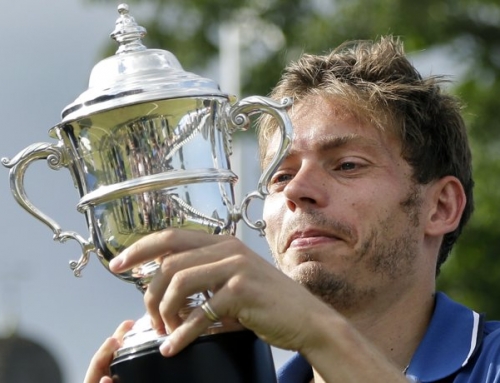 There is a Greek myth story of Tantalus who was punished. There was a lake that would recede every time he would get too close. There were branches of fruit that would lift higher each time he tried to reach for it. From the character Tantalus comes the word tantalize. This is the promise of something fulfilling that is yanked away when you covet it too much.
There is a Greek myth story of Tantalus who was punished. There was a lake that would recede every time he would get too close. There were branches of fruit that would lift higher each time he tried to reach for it. From the character Tantalus comes the word tantalize. This is the promise of something fulfilling that is yanked away when you covet it too much.
Such is how fans have reacted to Ernests Gulbis. He’s Marat Safin without Safin’s wins. Each time he’s made some progress, fans begin to murmur wondering if he’ll finally break through. This happened as long ago as 2007 when he reached the fourth round of the US Open, or in 2008 when he reached the quarterfinals of the French Open. As recently as last year at Wimbledon, Gulbis beat Tomas Berdych in three tiebreaks.
Perhaps it was a sign of things to come, but Gulbis would meet a similar version of himself, the wild Jerzy Janowicz in the next round. The two would battle for 5 sets, but few would know of Janowicz until he made his run to the Paris finals later that year. Even Janowicz would fade after losing a five setter to Florian Mayer in the following round.
Gulbis’s rank would drop once again to around 159 around October. This year, he didn’t bother to play the Australian Open.
Gulbis has stayed committed to his coach, Gunther Bresnik, who he says he gets along with. Gulbis doesn’t like practicing so much, but he does it because he must.
Ashley Fisher, former Australian doubles player turn commentator, has been doing courtside interviews, asked Gulbis after he won the title, how he managed to win games when he’s down break points. Gulbis said “Didn’t you ask me this question already?” which was the case because Gulbis had done something similar in most of his matches–digging himself in a hole, then digging himself out of the hole, and the final was no different.
Fisher responded that he’d been asking him questions all week long and he’d simply run out of questions to ask the Latvian.
Gulbis seemed unusually relaxed after the win. He couldn’t have asked for a better finalist, another player like him, ranked around 100, although, all things being equal, he has fared better against better players.
Roger-Vasselin is one of those players that has spent most of his career toiling in Challengers. Good enough that he would be considered a success if Challengers were meaningful, but not good enough to reliably do well at the ATP 250 level. To be honest, Gulbis has spent much of his career at this level as well, though Gulbis’s high and lows appear to swing more wildly. This was, after all, Roger-Vasselin’s first ATP tour final, a far cry from his father’s semifinal run to the French Open back in 1983. Remember Yannick Noah? Still the last French player to win the French Open? He beat Roger-Vasselin (the dad) in the semis that year. Crushed him, really.
The two played evenly in the first set, breaking each other twice, but it was Gulbis who claimed the tiebreak. Gulbis then got a break in the middle of the second set, and broke in the final game to secure a 63 set. Roger-Vasselin struggled a bit with his volleys.
Both these men had rankings so low (they are within 4 spots of each other ranked between 100 and 110) that they had to qualify to reach the finals. This meant 3 more matches for each of these players.
And because you need to enter a tournament 6 week before the tournament starts, neither Gulbis nor Roger-Vasselin can apply their rankings increase to get into, say, Indian Wells, they have to qualify at Indian Wells, so Gulbis has probably reached California and will be trying to qualify again.
In 2010, he had a nice run winning Delray Beach and playing well on the clay, but struggled at the French Open. His game still needs work. His forehand has become a bit erratic, and he’s changed his motion since about 2011, and still, it’s the more uncertain of the two sides, with his backhand the more reliable shot. Fortunately, he has a big serve, and he’s tried to push out the mental demons that used to plague him by not thinking too much when he plays. Just play the point and move on.
Gulbis may tantalize his fans once more. One forgets he’s only 24 and much of his magic occurred as a late teen, something that’s not seen so much these days.
In his mind, he still has time to do better.



![[Stockholm] Dimitrov wins first ATP title with 3-set victory over Ferrer](https://www.essentialtennis.com/wp-content/uploads/2013/10/20131021grigor-500x383.jpg)
![[Metz/St. Petersburg] Simon and Gulbis are champions!](https://www.essentialtennis.com/wp-content/uploads/2013/09/20130922gulbis-500x383.jpg)

